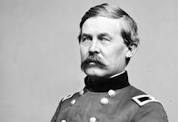|
by Adam De Gree
John Buford Jr. was born on March 4, 1826. Just 37 years later, he would lose his life in the Civil War after receiving a deathbed promotion to the position of major general of Volunteers from Abraham Lincoln. Known for his key role in major battles including Gettysburg, Buford had a profound impact on Union victory and is remembered as an American hero. Buford was born in Kentucky, which became a battleground state in the Civil War. When he was eight years old, his family moved to Illinois. His father was a well-known Democrat who opposed Abraham Lincoln. Like many Americans, Buford’s ancestors had fought in the Revolution; his grandfather served under Robert E. Lee’s father. Growing up in a political family, Buford was very patriotic. After one year at Knox College in Illinois, he was accepted to the United States Military Academy at West Point. Divisions between American society increased as Buford grew older. The issue of slavery split the country into two factions – North and South. But while the split sounds simple, it wasn’t – many families were split into two opposing camps. For example, Buford’s father owned slaves, although he did not want to leave the Union. On the other hand, Buford’s wife Pattie was from a Southern family, and his in-laws fought for the Confederacy. At West Point, young men from the north and south trained to become officers, only to fight against each other when war broke out. In 1861, the Civil War erupted. While Buford could have chosen to fight with the rebellious Confederates, he stayed in the United States Army and quickly rose to the rank of brigadier general. Buford was a cavalry officer, and one of the finest in the war. He served with distinction in major battles such as the Second Battle of Bull Run and the Battle of Brandy Station. However, John Buford is best remembered for his role in the Battle of Gettysburg. The Battle of Gettysburg was one of the most important battles of the entire Civil War, and Buford secured the field for a Union victory. As tens of thousands of troops from North and South neared one another, Buford’s cavalry arrived in the town of Gettysburg, located on high ground. As he looked down, the general saw thousands of Confederate troops marching up the road and knew that he had to hold the high ground if the Union was to win the battle. He boldly ordered his much smaller force to defend their position against the advancing Rebels. They held out just long enough for reinforcements to arrive and staked out a strong defensive position that held for three bloody days of fighting. Buford served ably for some months after Gettysburg. However, it became clear that he was sick, possibly with typhus. This was a serious issue because during the Civil War, more American soldiers died of an illness than of a bullet wound. Buford was quartered at the home of a fellow general in Washington for his last days. President Lincoln, upon hearing that the hero of Gettysburg was on his deathbed, promoted him to “Major General for distinguished and meritorious service.” Buford, upon hearing of his promotion, asked, “Does he mean it?” and then said, “it is too late, now I wish I could live.” John Buford’s funeral was attended by the President, and his pallbearers were Union generals. He was buried at West Point, where he joined other American war heroes. In response to his death, the Philadelphia Enquirer ran the poem: No more to follow his daring form Or see him dash through the battle's storm No more with him to ride down the foe And behold his falchion's crushing blow Nor hear his voice, like a rushing blast As rider and steed went charging past ... Buford is dead! Interesting Questions to Discuss with your Children:
Copyright ©2017 by the Classical Historian. All Rights Reserved.
0 Comments
Leave a Reply. |
John De GreeJohn De Gree writes the current events with a look at the history of each topic. Articles are written for the young person, aged 10-18, and Mr. De Gree carefully writes so that all readers can understand the event. The perspective the current events are written in is Judeo-Christian. Receive Articles and Coupons in Your EmailSign Up Now
For Email Marketing you can trust. Archives
June 2024
Categories
All
|
|
SUPPORT
|
RESOURCES
|
|



 RSS Feed
RSS Feed



